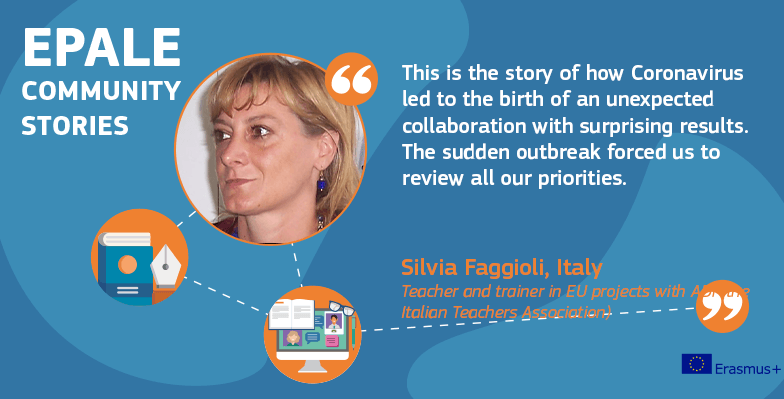I am a chemistry teacher and I collaborate with ADi, the Italian Teachers Association. I am in charge of the professional training of teachers and the European projects in which they are involved. Adi is part of the European Basic Skill Network, a non-profit network engaged in education policies with a particular interest in the development of basic adult skills. Last year I was elected to the Executive Committee. EBSN.
I found out about the EPALE platform when I started getting involved with European projects. I saw how it works as an excellent tool for disseminating the results of Erasmus projects and as a source of inspiration. I also translated into Italian part of the Capacity Building Series, published by EBSN on EPALE.
This is the story of how Coronavirus led to the birth of an unexpected collaboration with surprising results.
I am a teacher and member of an Association of Teachers called Adi. The pandemic broke out while ADI was working on building an Italian network of teachers involved in adult education. The sudden outbreak forced us to review all our priorities as many teachers struggled to manage the situation. In particular, we were asked for psychological support.
Insecurity in managing distance teaching tools, the relationship with learners, sometimes the enormous amount of work, were all factors causing widespread anxiety.
We looked for associations that had the necessary skills to help us. Elidea, a psychologist association specialising in work psychology, was our partner on a European Erasmus Project (more information on Skills Act 4 VET (link is external)). At the start of the lockdown they decided to launch a series of webinars in the field of digital psychological solidarity . ADi had no experience in conducting webinars, but the situation led to this new cooperation. The webinar, organised with ADi and aimed specifically at teachers, was free and open to all. It took place on Monday 27 April. 225 teachers joined from all over Italy, and abroad (Egypt, USA, Switzerland, Spain). The participants interacted via chats which we later analysed.
What were the topics that most “inflamed” the audience?
First, the lack of a direct relationship. These are some of the comments we gathered: “a sense of inadequacy as there is no real feedback on one’s teaching quality”. “The worst thing is to speak to a screen without having the presence of the pupils who, often supported by the parents, claim to have no video camera or microphone”. “With DaD (Didattica a distanza – Distant Teaching Activity) there is no feedback from the pupils, which means as a teacher you have a lot of uncertainties and you have to work three times harder to get a tenth of the results compared to face-to-face teaching”. However, the DaD also brought positive surprises related to digital skills, not only from the pupils, but also from the teachers. The following are the main comments written in the chat-box on this issue. Through the DaD I discovered skills that I would not have seen in a classroom and I was surprised that those who are not “strong” didactically showed strong skills. I had all the time I needed to enter the digital world! I am learning to use several new tools, resources that I can continue to use when we finally go back into the classroom. Compared to technology I am delighted to have the opportunity to experience the infinite potential of the different platforms.
Students are demonstrating a surprising capacity to concentrate and to respect the rules.
Finally, the issue of grades and examinations inspired comments which were not all negative. The following are just a snapshot. “This is the best time to motivate pupils to study”. “Even those who have so far been motivated, perhaps overly so by the value that is given to their “grades” can now take more care over the learning process and will get more satisfaction from it”. “You must be aware of the fact that it is not only content that determines a grade, but also skills that, in this situation, are beginning to emerge, such as digital, communicative and transversal skills (resilience, creativity)”. “Even the use of self-evaluation – asking how they worked and what they learned – can favour a shared evaluation”.
In conclusion, we learned that, despite the difficulties, the teachers are also able to see the opportunities that this situation is creating and how new skills are being developed.
Italian version: https://epale.ec.europa.eu/it/blog/silvia-faggioli-community-story-italy

